Related Research Articles
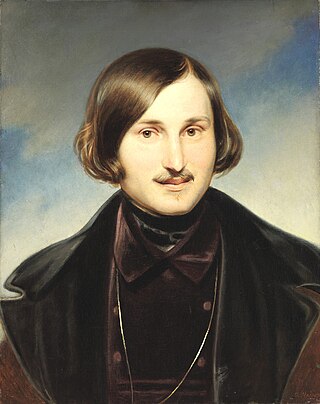
Nikolai Vasilyevich Gogol was a Russian novelist, short story writer, and playwright of Ukrainian origin.

Taras Hryhorovych Shevchenko was a Ukrainian poet, writer, artist, public and political figure, folklorist and ethnographer. He was a fellow of the Imperial Academy of Arts and a member of the Brotherhood of Saints Cyril and Methodius. He wrote poetry in Ukrainian and prose in Russian.
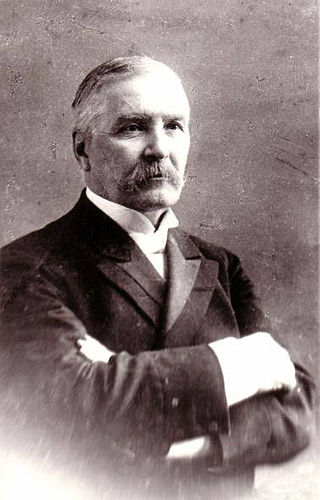
Mykola Vitaliiovych Lysenko was a Ukrainian composer, pianist, conductor and ethnomusicologist of the late Romantic period. In his time he was the central figure of Ukrainian music, with an oeuvre that includes operas, art songs, choral works, orchestral and chamber pieces, and a wide variety of solo piano music. He is often credited with founding a national music tradition during the Ukrainian national revival, in the vein of contemporaries such as Grieg in Norway, The Five in Russia as well as Smetana and Dvořák in what is now the Czech Republic.

Lesya Ukrainka was one of Ukrainian literature's foremost writers, best known for her poems and plays. She was also an active political, civil, and feminist activist.

Ukrainian literature is literature written in the Ukrainian language.
Perebendya is a poem by Taras Shevchenko about the blind itinerant Ukrainian bard (Kobzar).

The Ukrainian Bandurist Chorus is a semi-professional male choir which accompanies itself with the multi-stringed Ukrainian ethnic instrument known as the bandura. It traces its roots to Ukraine in 1918 and has been based in the USA since 1949.
Perets is a Ukrainian satirical and humorous illustrated magazine. Together with the Moscow "Krocodil" "Pepper" was one of the two most popular comedy magazines in the USSR.
Vasyl Andriiovych Symonenko was a Ukrainian poet, journalist, activist of dissident movement. He is considered one of the most important figures in Ukrainian literature of the early 1960s. In the opinion of the Museum of the Dissident Movement in Kyiv, the works and early death of Vasyl Symonenko had an enormous impact on the rise of the national democratic movement in Ukraine.
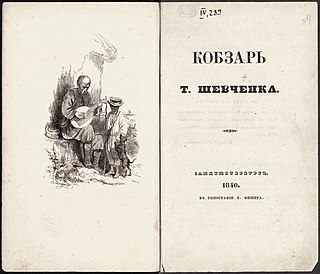
Kobzar, is a book of poems by Ukrainian poet and painter Taras Shevchenko, first published by Shevchenko in 1840 in Saint Petersburg, Russian Empire. Taras Shevchenko, born in Moryntsi, Kyiv Governorate, in what is now Ukraine, was nicknamed The Kobzar after the publishing of this collection. From that time on this title has been applied to Shevchenko's poetry in general and acquired a symbolic meaning of the Ukrainian national and literary revival.

Yevhen Pavlovych Hrebinka was a Ukrainian romantic prose writer, poet, and philanthropist. He wrote in both the Ukrainian and Russian languages. He was an older brother of the architect Mykola Hrebinka.

Shevchenko National Prize is the highest state prize of Ukraine for works of culture and arts awarded since 1961. It is named after the inspirer of Ukrainian national revival Taras Shevchenko. It is one of the five state prizes of Ukraine that are awarded for achievements in various fields.

Volodymyr Harbuz is a Ukrainian painter and graphic artist He is a member of the National Union of Artists of Ukraine since 1988, and repeated nominee of the Shevchenko National Prize.
KOBZAR Book Award is a biennial literary award that "recognizes outstanding contributions to Canadian literary arts by authors who develop a Ukrainian Canadian theme with literary merit". The prize is CA$25,000. It is awarded in one of several genres: literary non-fiction, fiction, poetry, young readers' literature, plays, screenplays and musicals. The award was established in 2003 by the Shevchenko Foundation and the inaugural ceremony was held in 2006.
The Vasyl Stus Prize, given since January 1989, is the first non-governmental prize awarded for "talent and courage" and being worthy of the memory of Vasyl Stus. This Prize was set up by the Ukrainian Association of the Independent Creative Intelligentsia and awarded every year on the poet's, Stus', date of birth in Lviv. In 1990 it moved to Kyiv.
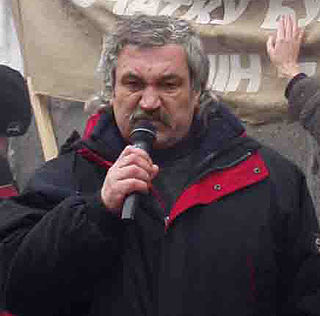
Vasyl Mykolayovych Shkliar (Ukrainian: Василь Миколайович Шкляр; born 10 June 1951 in Hanzhalivka, Lysianka Raion is a Ukrainian writer and political activist. He is one of the most well known and widely read, contemporary Ukrainian authors. Some observers have even named him the “Father of the Ukrainian Bestseller”. The Committee of the Shevchenko National Prize declared him a Shevchenko Prize Laureate in 2011.

Sofia Rusova (née Lindfors), was a Ukrainian pedagogue, author, women's rights advocate, and political activist.
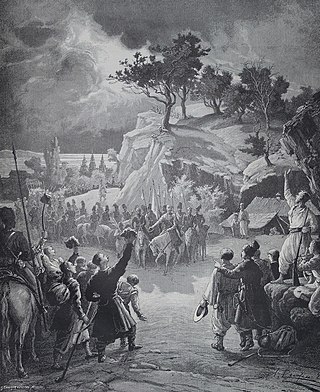
Haidamaki, also transliterated Hajdamaky,Haydamaki, or as Haydamaks is an epic poem by Taras Shevchenko about the Koliivshchyna led by Maksym Zalizniak and Ivan Gonta.

Yevhen Oleksandrovych Sverstiuk was a Ukrainian literary critic, essayist, poet, think tank, philosopher, participant of the sixtiers movement, and political prisoner of the Soviet regime. Sverstiuk studied the work of Nikolai Gogol, Taras Shevchenko, and Ivan Franko. He was the founder and, since 1989 a permanent editor of the Orthodox newspaper Nasha Vira, president of the Ukrainian PEN Club. Doctor of Philosophy. Author of one of the most important texts of Ukrainian self-publishing About the process of Pogruzhalskyi, head of Ukrainian Association of Independent Creative Intelligentsia.